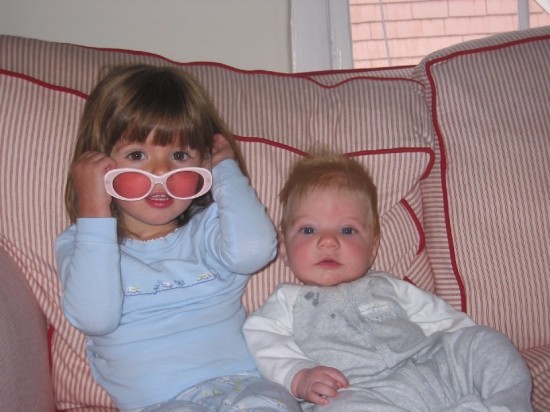
May 2005
There’s one thing I totally failed to say in my post about the World Cup. It is that one of my very favorite things about the phenomenon I observed of people falling in love with the US women’s soccer team was how it happened to both boys and girls. Whit was as excited to watch the games as Grace was. I loved seeing both men and women, adults and children both, commenting on the powerful example those US women set.
And I think that is crucial. I want Whit to admire female athletes as much as I want Grace to esteem men’s sports. As long as girls only root for girls and vice versa, I think we’re missing something essential. But when everybody celebrates everybody else, for their particular grace and grit, then, I think, we’ve achieved what we aim for. I loved watching that around me in this summer’s World Cup soccer matches.
This transfers over into other realms, too. It is specifically resonant, for me, in the realm of working motherhood. Quite often people comment on what it is like to be working mother to a daughter. They say that I must be pleased to be a role model for Grace.
As an aside, I feel the need to be crystal clear here: there are many successful and elegant paths through the forest of motherhood and work, and everybody finds the one that works for them and their family. Mine happens to be working in a full-time professional setting, and so that is what I comment on for myself.
And I am proud of the example I’m setting for Grace. There’s no question about that. But I’m equally cognizant of setting an example for Whit. It’s as simple – and as complicated – as that. I think both girls and boys need to honor and appreciate the various ways that both men and women can be in the world. I think both boys and girls need to recognize the efforts of all adults in their family. I have never thought equal meant precisely the same, and I don’t here – men and women are different in a million ways, but they are equivalently important (in my opinion). I sense Whit’s gaze on me as I stumble my way through working motherhood just as heavily as I do Grace’s.

Lindsey, this is eloquently stated and I agree, even though I’m a non sports spectator myself, the concept remains true to all realms.
Yes, both boys and girls need to see lots of models of adulthood. I am not currently working and love that my son gets to know both stay at home moms and dads as well as working moms and dads. It is a great time for kids to see the very many options both men and women have as adults. I like that we live in a time and place where kids can see so very many ways that families can make life work.
Beautifully said, as always. And: yes!
Thank you so much. xox
I agree!
thank you! xox
Thank you for another beautifully written, thought-provoking post.
I wonder if others notice that we often encounter the term “working mother,” but not nearly as often the term “working father.”
It seems to me that it is usually assumed that the father is working, so the term used is just father without the adjective working.
Is my perception accurate?
Yes, I share your perception. The truth is that I don’t sense the same tension between the two roles in my husband (not because he doesn’t love being a father – he does – he just never expected to do anything other than what he’s doing, which is work and parent simultaneously). I’m also the default parent, which is the way I want it, but it creates more opportunities for friction and trade-offs for me on a daily basis! xoxox
I’ve been loving your posts on parity in sports and the marvelousness of the women’s soccer team. Thank you for writing about this. I heartily agree that we are moving towards respect of the athlete regardless of gender.
As an aside I am a stay at home mom and really struggle with the fact that my kids grow up in a family where only the dad “works”. The day I heard “my mommy doesn’t do anything” prompted a come to Jesus convo about the definition of work and a discussion of powerful women who are changing the world. I look forward to the day I can work full time too.